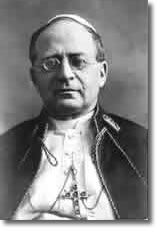|
Papal Encyclical |
|
Monthly Feature
|
Vigilanti Cura
Encyclical of Pope Pius XI on
the Motion Picture
1936
INTRODUCTION
 In
following with vigilant eye, as Our Pastoral Office requires, the
beneficent work of Our Brethren in the Episcopate and of the
faithful, it has been highly pleasing to Us to learn of the fruits
already gathered and of the progress which continues to be made by
that prudent initiative launched more than two years ago as a holy
crusade against the abuses of the motion pictures and entrusted in a
special manner to the "Legion of Decency." In
following with vigilant eye, as Our Pastoral Office requires, the
beneficent work of Our Brethren in the Episcopate and of the
faithful, it has been highly pleasing to Us to learn of the fruits
already gathered and of the progress which continues to be made by
that prudent initiative launched more than two years ago as a holy
crusade against the abuses of the motion pictures and entrusted in a
special manner to the "Legion of Decency."
This excellent experiment now
offers Us a most welcome opportunity of manifesting more fully Our
thought in regard to a matter which touches intimately the moral and
religious life of the entire Christian people.
First of all, We express Our
gratitude to the Hierarchy of the United States of America and to
the faithful who cooperated with them, for the important results
already achieved, under their direction and guidance, by the "Legion
of Decency." And Our gratitude is all the livelier for the fact that
We were deeply anguished to note with each passing day the
lamentable progress of the motion picture art and industry in the
portrayal of sin and vice.
I.
PREVIOUS WARNINGS RECALLED
As often as the occasion has
presented itself, We have considered it the duty of Our high Office
to direct to this condition the attention not only of the Episcopate
and the Clergy but also of all men who are right-minded and
solicitous for the public weal.
In the Encyclical "Divini illius
Magistri," We had already deplored that "potent instrumentalities of
publicity (such as the cinema) which might be of great advantage to
learning and to education were they properly directed by healthy
principles, often unfortunately serve as an incentive to evil
passions and are subordinated to sordid gain." 1
The
Influence of the Motion Picture
In August 1934, addressing
Ourselves to a delegation of the International Federation of the
Motion Picture Press, We pointed out the very great importance which
the motion picture has acquired in our days and its vast influence
alike in the promotion of good and in the insinuation of evil, and
We called to mind that it is necessary to apply to the cinema the
supreme rule which must direct and regulate the great gift of art in
order that it may not find itself in continual conflict with
Christian morality or even with simple human morality based upon the
natural law. The essential purpose of art, its raison d'ętre, is to
assist in the perfection of the moral personality, which is man, and
for this reason it must itself be moral. And We concluded amidst the
manifest approval of that elect body - the memory is still dear to
Us — by recommending to them the necessity of making the motion
picture "moral, an influence for good morals, an educator.”
Encyclical cont'd....MORE>>>
 |
